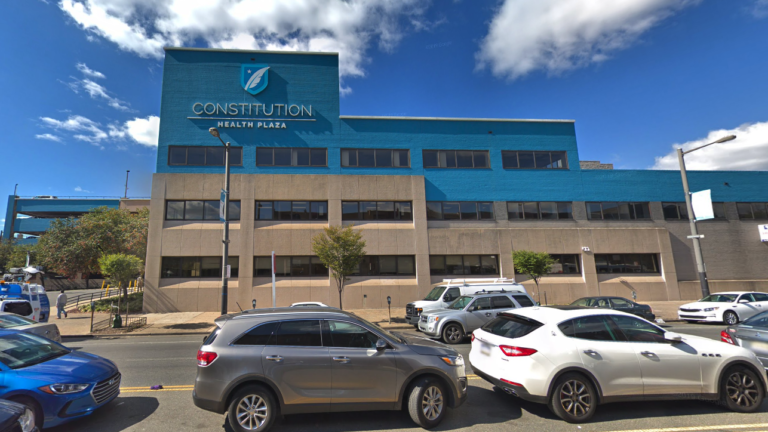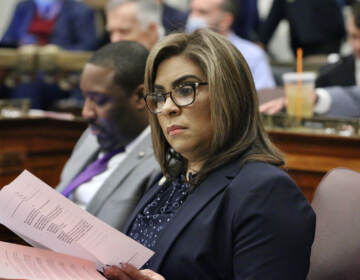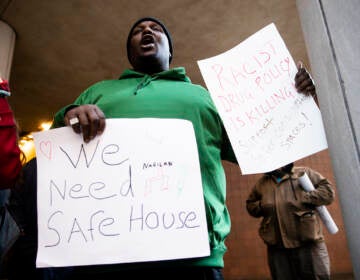Safehouse hits pause on plan to open supervised injection site in South Philly
Earlier, City Councilmember David Oh introduced, to wide support among his outraged colleagues, a bill that will effectively ban such sites in Philadelphia.

Constitution Health Plaza (Google Maps)
Updated 8:05 p.m.
Safehouse will halt its plans to open a supervised injection site in South Philadelphia due to community opposition.
Safehouse Vice President Ronda Goldfein confirmed Thursday evening that her group had heard neighbors loud and clear and wanted to give the community an opportunity to have “meaningful conversations,” about what a site in their neighborhood would mean.
“We’re going to take a pause, even though we are legally entitled to open,” said Goldfein, stressing that she wanted to mark the clear distinction between a federal judge’s ruling that a supervised injection site would not violate federal law and the nonprofit’s decision to wait for community input.
Immediately after Safehouse announced it would pause its plans, the owner of Constitution Health Plaza on South Broad Street, which had been the slated location for the site, confirmed that plans for Safehouse to be housed there had been canceled.
“We made the original decision to provide space to Safehouse to play a positive role in providing an innovative way to bring needed services to those suffering from addiction,” the plaza’s owners wrote in a letter addressed to tenants, partners and friends. “As one of the largest institutions in our community, we felt we had a responsibility to do something to save lives.”
The building owners thanked everyone on both sides of the issue for their honest feedback.
“We want you to know that we have listened. We apologize. And we want to ensure open lines of communication moving forward,” they wrote, thanking Mayor Jim Kenney and Safehouse for their work in seeking to find new ways to tackle the opioid epidemic.
In a statement Thursday night, Kenney confirmed the building owner had pulled out of the lease.
Goldfein said Safehouse would need to regroup and figure out next steps over the weekend.
The response came after a long day of community outrage. Earlier on Thursday, an angry City Council expressed its deep dismay over Safehouse’s surprise proposal to place a supervised injection site in South Philadelphia.
Days after a federal judge issued a ruling that gave the nonprofit the go-ahead to open what would be the nation’s first supervised injection site, Councilmember David Oh introduced legislation that could prevent future such sites from launching. Oh’s measure would not have stopped Safehouse from opening at Constitution Health Plaza.
Prior to the lease’s cancellation, the only hope for opponents of that site would have been the request for an administrative stay filed Thursday evening with U.S. District Court by U.S. Attorney William McSwain. If granted, a stay would stop Safehouse from opening anywhere while McSwain’s appeal moves through the Third Circuit Court of Appeals.
Safehouse had planned to open in South Philadelphia next week.
At City Council’s session earlier in the day, Councilmember Kenyatta Johnson, who represents the area where the facility was planned, spoke passionately against the idea.
“What about the kid that picks up a needle and pricks themselves on the way to school,” asked Johnson. “What about the kid that picks up a bag of heroin outside the facility? Don’t we have a right to protect the children?”
Johnson said that the location Safehouse had proposed was too close to day care centers and a public high school, and that neighborhood groups had not been adequately consulted about the proposal.
Because the proposed location was in a former hospital zoned as a medical facility, the supervised injection site could have opened there by-right, without zoning variances or neighborhood meetings, Johnson conceded.
As introduced, Oh’s bill would make it next to impossible to open supervised injection sites in Philadelphia by adding them to a list of what the city terms “nuisance health establishments.” That category was created by a 2014 law meant to crackdown on “pill mill” medical facilities that were giving out opioid prescriptions too freely.
To avoid being slapped with a “nuisance health establishment” label, anyone hoping to open a supervised injection site would have to publicize those plans six months in advance to all residences, businesses, and institutions within a one-mile radius of a proposed location. A City Council hearing would have to take place three months before the facility opened.
A proposed Safehouse facility would allow people to inject their own illicit drugs in a clinic-like setting, under medical supervision. While hundreds of similar facilities exist in Europe and Canada, the Safehouse site would be the first one in the United States.
Safehouse has worked with the Kenney administration for close to two years to open in Philadelphia. The city suffers from a stunningly high overdose rate, with 3,500 residents dying since 2017.
City Councilmembers like Maria Quiñones-Sánchez and Mark Squilla have long expressed skepticism about Safehouse’s proposal. Neighborhood opposition to Safehouse has primarily been focused in Kensington, which has the highest overdose rate of any Philadelphia neighborhood, making it what most assumed would be a natural fit as a first location for Safehouse.
Quiñones-Sánchez had long criticized Safehouse’s proposal to open a supervised injection site in Kensington, which largely lies in her council district. Despite her opposition, she participated with administration officials like Brian Abernathy, Philadelphia’s managing director, in a series of ongoing community meetings about locating a supervised injection site in that neighborhood.
On Thursday, Quiñones-Sánchez said any ground gained in those meetings has now been lost.
“[It] was blown up because one or two people decided I would rather beg for forgiveness than ask for permission,” said Quiñones-Sánchez. “For an administration that continuously talks about Trump, and how the federal government is disrespectful and has lost its humanity, and now we do the same thing. People deserve a process.”
On Tuesday, a federal judge issued a final decision granting Safehouse permission to open. The nonprofit had been mired in a yearlong court battle with U.S. Attorney McSwain, who had sued Safehouse in civil court to prevent it from opening.
McSwain contended that a supervised injection site would violate the section of the U.S. Controlled Substances Act commonly known as the “crackhouse statute,” which makes illegal any space maintained for the purpose of using illicit drugs. U.S. District Judge Gerald McHugh ruled that Safehouse would not violate federal law because its main purpose was saving lives, not promoting drug use.
After Tuesday’s final ruling by McHugh, Safehouse board members Goldfein, of the AIDS Law Project, and former Pennsylvania Gov. Ed Rendell held a press conference and announced that the first site would be in South Philadelphia, not Kensington. The news came as a surprise to residents and elected officials alike.
In introducing his legislation Thursday, Oh denounced what he characterized as a lack of transparency.
“This was done very secretly —I believe it was done intentionally so that the public could not have input,” Oh said.
Specifically, Oh’s bill would require that a supervised injection site receive the approval of 90% of residents, businesses, and institutions in a one-mile radius — although it is not immediately clear how such support would be tallied, or how it would be enforced.
City Health Commissioner Thomas Farley, who is on Safehouse’s advisory board and whose department would be responsible for implementing the revised health code, had not yet reviewed Oh’s bill and so could not comment on it.
Councilmember Helen Gym said that Oh’s bill would effectively ban supervised injection sites from the city.
“The threshold is far too high,” said Gym. “It [Oh’s bill] needs to be carefully reviewed, but I think it’s deeply problematic.”
Throughout the council session, numerous members echoed Johnson and Oh’s opposition to Safehouse. They denounced the lack of public engagement before Safehouse’s announcement about a South Philadelphia location.
Councilmembers also worried other neighborhoods could be next.
“People are going to try to guilt-trip you, say that you don’t have any compassion, that you don’t have any empathy,” said Cherelle Parker, whose district includes many suburban-style neighborhoods in Northeast and Northwest Philadelphia. “But when you are a homeowner, what is going there will have an impact not just on your quality of life but on the value of what could be your only asset. You have a right to speak.”
City Councilmembers weren’t the only ones unhappy with the South Philadelphia location. Many of the state representatives and senators who represent the area expressed reservations about the lack of community engagement.
“Safehouse was beginning to build public support through a patient and transparent dialog with Philadelphians before blindsiding residents with this bait-and-switch. Trust has been lost,” State Sen. Larry Farnese.
State Rep. Elizabeth Fiedler, D-Phila; Rep. Jordan Harris, D-Phila., the House Democratic whip; and Rep. Maria Donatucci expressed concern about holding community meetings after a site opened and not before. In a written statement, they asked Safehouse to reconsider its timeline.
In a statement issued earlier Thursday, McSwain said, “The sad fact is that Safehouse’s secretive, haphazard `plan’ has not been vetted with any of the affected neighborhood residents, community groups, City Council members, State Representatives or State Senators. It is being unfairly foisted on them on the assumption that they don’t matter. It is treating them like fools.”
WHYY is your source for fact-based, in-depth journalism and information. As a nonprofit organization, we rely on financial support from readers like you. Please give today.








